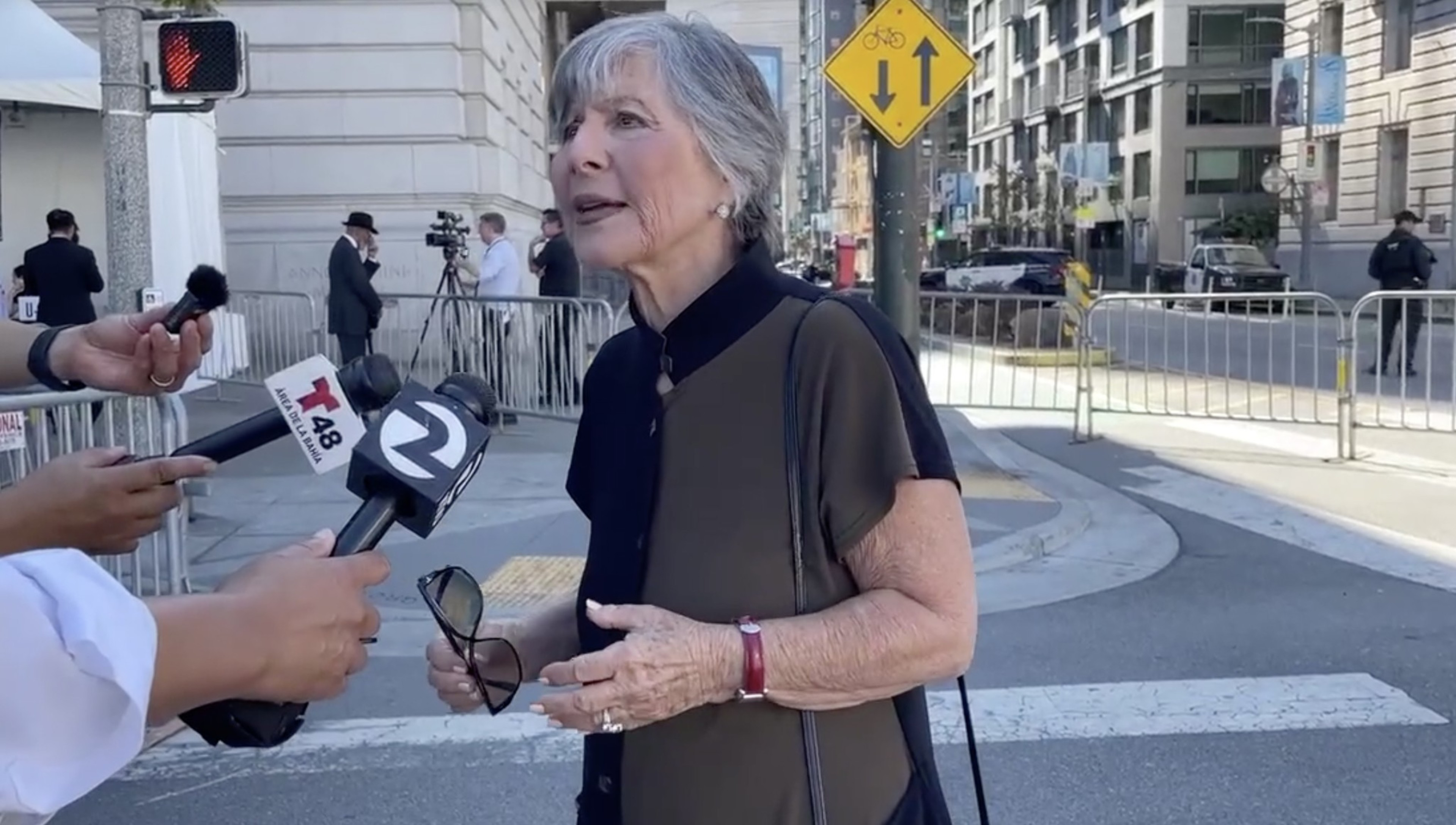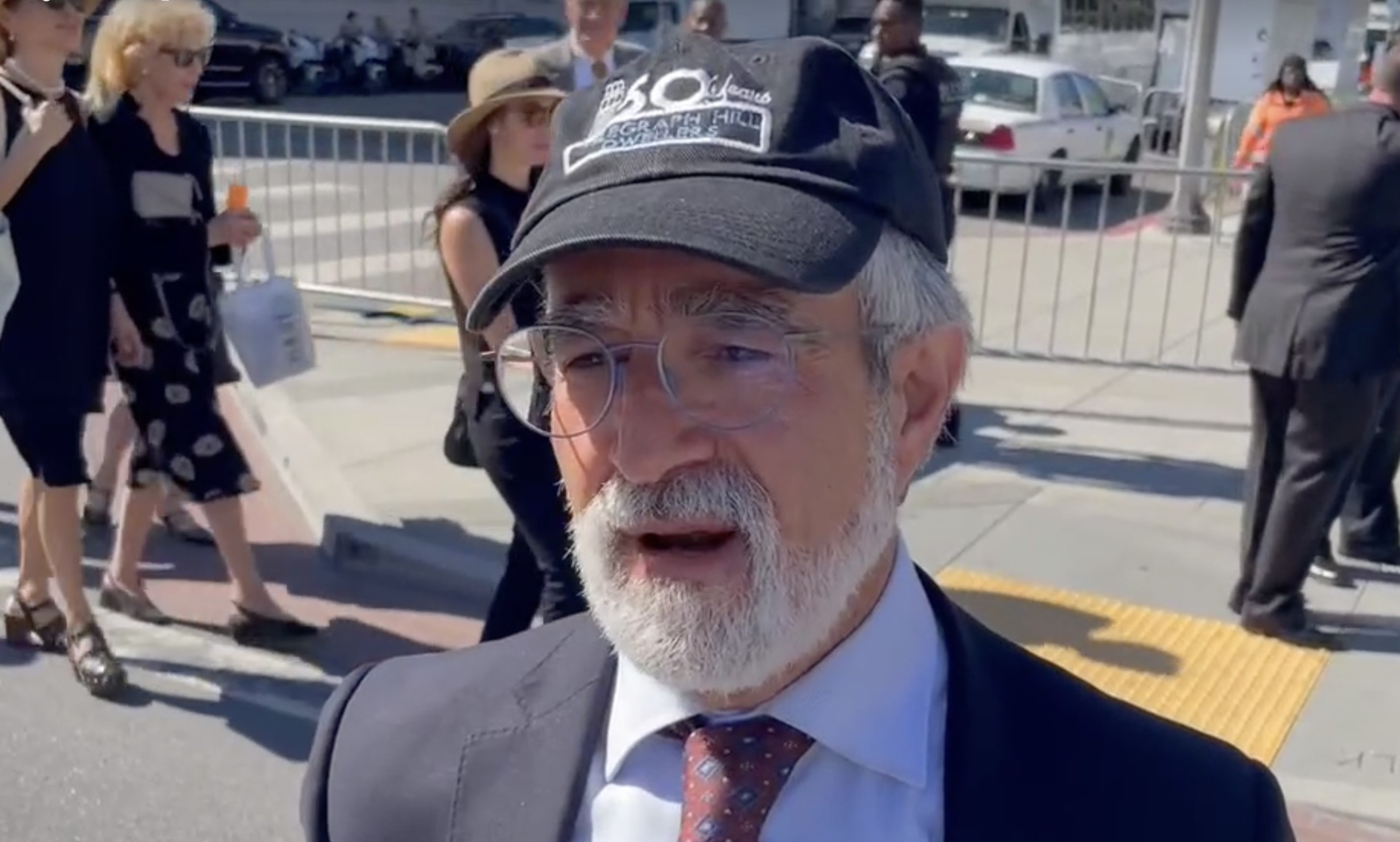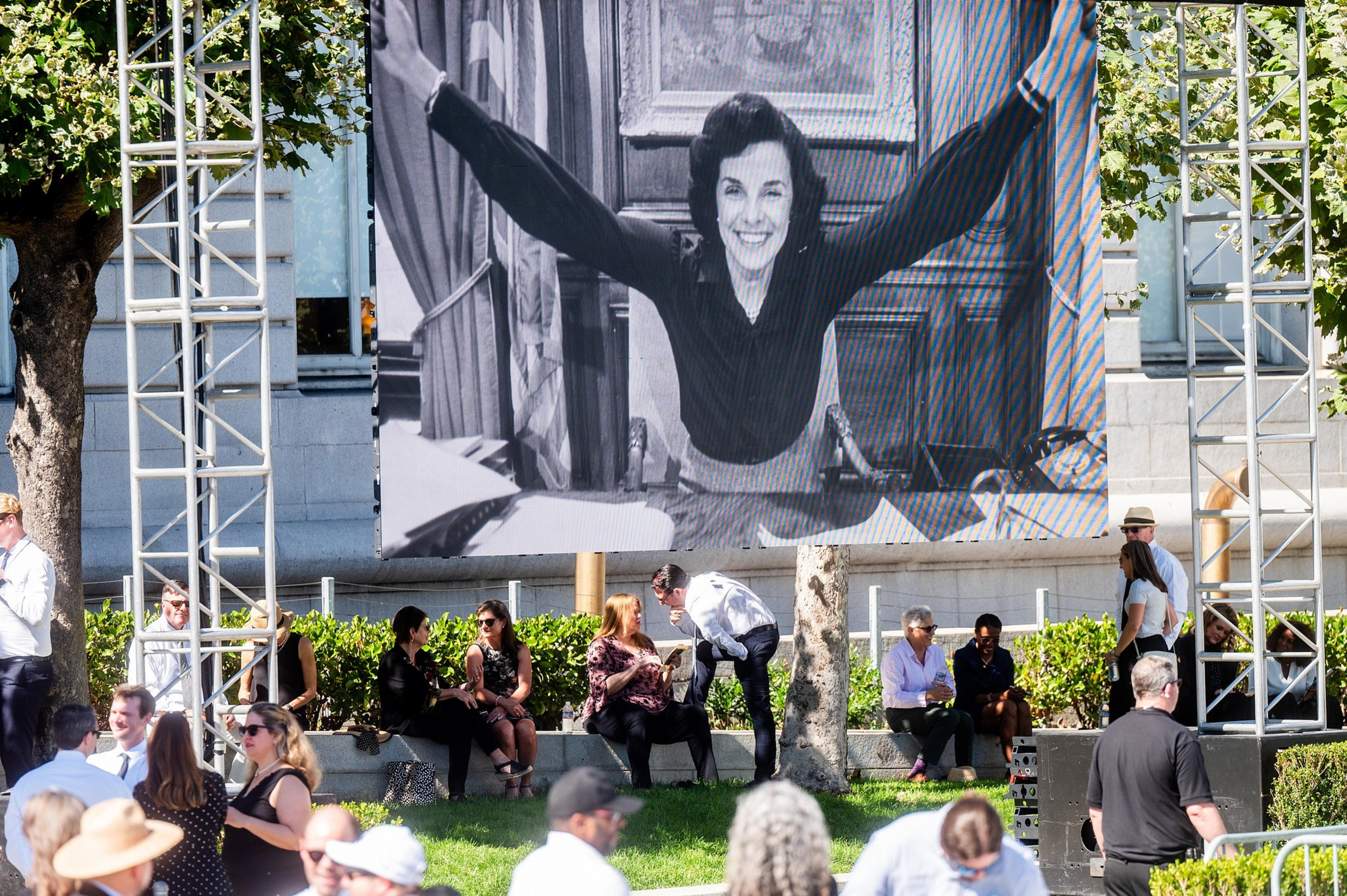Dianne Feinstein, who rose from San Francisco City Hall to the U.S. Senate, serving for more than 30 years, was mourned and lionized Thursday in a ceremony attended by Vice President Kamala Harris, Senate Majority Leader Chuck Schumer and other national and local officials.
As several hundred dignitaries gathered in front of City Hall under a blazing sun around 1:30 p.m., Mayor London Breed delivered opening remarks. Seconds after she began speaking, she was interrupted by the U.S. Navy’s Blue Angels flying over in tribute to Feinstein, who was instrumental in launching San Francisco Fleet Week. The annual air show is happening this week.

“Thank you for bringing the Blue Angels to San Francisco,” the mayor quipped, not missing a beat.
The service marked the end of two days of events in the city that launched Feinstein’s political career. On Wednesday, mourners streamed into City Hall to pay their respects, honoring Feinstein as fearless, smart and the glue who kept the city together after two shocking political assassinations.
Feinstein died early Friday in her Washington, D.C., home of natural causes, said Adam Russell, a spokesperson for her office. She was 90.
A recorded message from President Joe Biden was played at Thursday’s memorial. Biden, who served in the Senate alongside Feinstein for years, praised her character and called her “tough, prepared, rigorous, compassionate.”
“She turned passion into purpose,” Biden said, and “served for the right reason.”
Harris called her an “icon of California, an American patriot, a giant of the Senate and a dear friend.”
“Simply put,” said the vice president, “she was a force.”

Gallery of 11 photos
the slideshow
Others in attendance Thursday included Gov. Gavin Newsom, former Gov. Jerry Brown, state Sen. Scott Wiener, U.S. Rep. John Garamendi, City Attorney David Chiu, Assemblymember Phil Ting and San Francisco District Attorney Brooke Jenkins.
The service was closed to the public.
SEE MORE: Dianne Feinstein’s Funeral: How To Watch on Livestream
Tributes From Schumer, Pelosi
Schumer remembered Feinstein as “strong, unflappable, winning, fierce, practical, earnest.” However, the New York Democrat said that “one quality above all stands out in my mind and will forever set Dianne apart: integrity.”
In pushing for legislation to ban assault weapons, protect the environment and advance women’s rights, Feinstein had “an internal gyroscope that … never let her stray from a cause she knew was right,” Schumer said. “When she embraced an issue, she pursued it until the end.”
Schumer recalled Feinstein’s ability to work across the political aisle, calling her “one of Senate’s great dealmakers.”

“If there was the smallest bit of common ground, she would pursue it,” he said. She was the “living embodiment of what the Senate should always be, an institution built on cooperation.”
Speaker Emerita Nancy Pelosi, who became a member of the U.S. House of Representatives just a few years before Feinstein entered the Senate, offered many personal recollections of her fellow San Franciscan, recalling Feinstein’s ability to serve as a matchmaker and her love of growing flowers and painting them.
Alluding to Feinstein’s refusal to step down even amid serious health issues and questions about her cognitive abilities, Pelosi said, “Dianne left us as she had lived—on her own terms.”
Out of Tragedy, a Monumental Ascent
Feinstein spent much of her career in the Senate but, as Pelosi said, will be known as the “forever mayor” of San Francisco, a role she inherited in tragedy.
Feinstein was serving as Board of Supervisors president when Dan White, a former supervisor, assassinated Mayor George Moscone and Supervisor Harvey Milk, the city’s first openly gay supervisor, at City Hall on Nov. 27, 1978. Feinstein became acting mayor and went on to serve as mayor until 1988.
“She lost twice for mayor in a contested election, and she literally, I think, was about to leave politics—period,” former Mayor Willie Brown told The Standard. “But her ascendancy to the throne by virtue of Moscone’s death gave her exposure, and it was the same time that crazy-ass preacher killed all those people.”
Nine days before the Moscone and Milk assassinations, cult leader Jim Jones, head of the Peoples Temple in San Francisco, led a mass murder-suicide of more than 900 people in Guyana, where the congregation had relocated.
“She got the city and country through that traumatic period,” recalled Rep. Zoe Lofgren as she arrived Thursday at City Hall.
As mayor, Feinstein oversaw the renovation of the city’s cable car system and survived a recall attempt in 1983.
Breed, who ascended to the Mayor’s Office following the sudden death of Mayor Ed Lee, said that Feinstein’s advice “on how to heal and lead” gave her strength.
Rabbi Jonathan Singer from Temple Emanu-el called Feinstein a “woman of valor.”
A ‘Hawk-Like’ Attention to Detail
Arriving at City Hall, former Feinstein staffer Gil Duran stopped to talk to reporters and shared a memory of Feinstein calling up a health care insurance company CEO directly to make sure a woman with cancer didn’t have her coverage dropped. That conversation, he said, was illustrative of the kind of attention Feinstein paid to constituents.
“She paid really close attention not only to the big stuff, but to the little constituent details that most people don’t pay attention to,” Duran said. “Every letter that went to a constituent, she had to see it; she had to approve it. And I can tell you, nobody else is doing that in politics. … Some intern is writing those letters, and a staffer signs it.
“Little things like that she did—people don’t realize the degree to which her hawk-like attention could get big results.”

Wiener called Feinstein a “real character.”
“Her veneer was so prim and proper that people didn’t realize how much of a funny personality she had,” said the former San Francisco supervisor. He recalled that when he was running for supervisor in 2010 and Feinstein endorsed him, he went to meet with her.
Instead of the very brief meeting he anticipated, the session lasted an hour. Feinstein asked to see his campaign literature. “Literally, she edited the whole thing,” Wiener said, “and told me what was good and what was not good.”

A 30-Year Career in the Senate
Among those attending Thursday’s funeral was former Sen. Barbara Boxer, who won election to the Senate alongside Feinstein in 1992, dubbed the “Year of the Woman.”
“I think a lot of people don’t know that we came from different factions of the Democratic Party,” Boxer said. “I was more liberal; she was more centrist.” However, the two were able to join forces and “work together to do the job.”
“For us together, the constant was California,” Boxer said.
Feinstein went on to become the longest-serving woman in the U.S. Senate and its oldest member, serving a total of 30 years in office. Before facing calls to resign amid questions about her health, Feinstein carved out a legacy as a tough lawmaker whose signature achievements included a federal assault weapons ban passed in 1994, prohibiting the sale, manufacture and import of military-style assault weapons. That law expired in 2014.
In 2009, Feinstein became the first woman to chair the Senate Select Committee on Intelligence, a position she held for six years. Her work during this time helped expose the CIA’s detention and interrogation program (opens in new tab), which included torturing prisoners.
In 2017, Feinstein became the top Democrat on the Senate Judiciary Committee—the first woman to assume that role. She held that position until 2021.

While Feinstein’s career sent her to Washington, she remained deeply involved in the affairs of San Francisco, the city where she was born and raised. She often called her successors—including Newsom—to complain about potholes or trash and to offer advice and encouragement.
Supervisor Aaron Peskin said outside City Hall on Thursday that Feinstein “never stopped being mayor.” She would read local media and would call his office to express her “pleasure or displeasure.” That, he said, “could be painful, or it could be wonderful.”
San Francisco Giants CEO Larry Baer was also in attendance. He said that his relationship with Feinstein dated to the 1980s. “In 1987, she carried the first measure for a new ballpark, Prop. W, and started the ball rolling in creating the downtown ballpark,” he said.
“I loved Dianne. She cared so much about San Francisco.”
Thursday’s ceremony concluded with humorous and touching remarks from Eileen Mariano, Feinstein’s granddaughter, who said the senator gave her advice including “work to your long suit,” “earn your spurs,” “keep going no matter what” and no matter where you are going, “always bring a black pantsuit.”
Feinstein, she said, was “a constant and unyielding source of love.”
“You will always, always be my sunshine,” she concluded.











